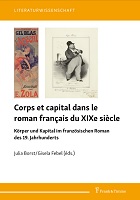Corps et capital dans le roman français du XIXe siècle = Körper und Kapital im französischen Roman des 19. Jahrhunderts
Contributor(s)
Borst, Julia (editor)
Febel, Gisela (editor)
Language
German; FrenchAbstract
Since Pierre Bourdieu, we have known that the body forms incorporated cultural and social capital. It is a commodity and means of production, a sign of belonging to a social class, a place where sex, gender and power relations are negotiated or a pretext for social exclusions and racism. The body is the object of punishments, sanctions and social control, a support for affects, obsessions and illnesses as well as a site of rebellion and resistance. The 19th century novels analyzed in the contributions to this volume tell all this. From the perspective of current body studies, we propose a new reading of the great stories from Balzac to Zola, via Mirbeau, Maupassant, Louise Michel, Georges Sand, Rachilde, Eugène Sue and Huysmans to demonstrate, through their texts, how the Images of the body and the policies of capital are part of the imagination and memory of 19th century French society.


 Download
Download